- Poll dancing - 23rd January 2026
- Paper thinner - 22nd January 2026
- Jobs for the boys and girls - 21st January 2026
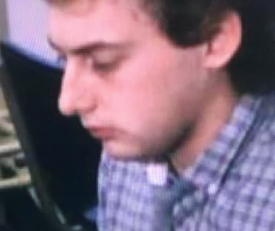
After a 23 year career with BBC Cymru Wales (BBC CW), and 38 years in journalism, (when he was trained to use clear and simple language, avoiding jargon), our Editor, Welshman, Phil Parry, looks at China’s role now in washing clean away the crimes in Ukraine caused by Russia, as it’s reported that media freedom there is declining at ‘breakneck speed’.
Earlier he has described how he was assisted in breaking into the South Wales Echo office car when he was a cub reporter, recalled his early career as a journalist, the importance of experience in the job, and made clear that the ‘calls’ to emergency services as well as court cases are central to any media operation.

He has also explored how poorly paid most journalism is when trainee reporters had to live in squalid flats, the vital role of expenses, and about one of his most important stories on the now-scrapped 53 year-old BBC Wales TV Current Affairs series, Week In Week Out (WIWO), which won an award even after it was axed, long after his career really took off.
Phil has explained too how crucial it is actually to speak to people, the virtue of speed as well as accuracy, why knowledge of ‘history’ is vital, how certain material was removed from TV Current Affairs programmes when secret cameras had to be used, and some of those he has interviewed.

He has disclosed as well why investigative journalism is needed now more than ever although others have different opinions, how the current coronavirus (Covid-19) lockdownis playing havoc with media schedules, and the importance of the hugely lower average age of some political leaders compared with when he started reporting.
Recent revelations of the atrocities in Ukraine caused by Russia focus attention on its big supporter China, which claims it has a “rock solid friendship” with the invader, and is responsible for an appalling official attack on a free media.
Apart from outlawing an independent press, last month, the Chinese Foreign Minister Wang Yi said cooperation between the countries is advantageous to the two peoples, and leader Xi Jinping has stated that their friendship “knows no limits”.
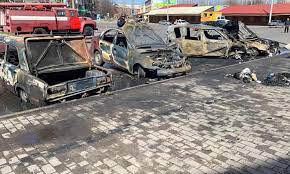
But comments like these sit uneasily with what is happening now in Ukraine.
At Kramatorsk two Russian rockets landed near a railway station packed with civilian refugees, killing dozens of people, and injuring over 100, with at least five children among the dead.
The Ukrainian foreign minister, Dmytro Kuleba, accused Russia of “deliberate slaughter”, saying on Twitter: “Russians knew that the train station in Kramatorsk was full of civilians waiting to be evacuated. Yet they struck it with a ballistic missile, killing at least 39 and injuring at least a hundred people.
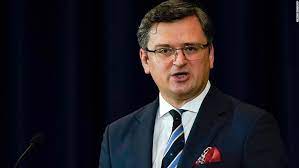
“This was a deliberate slaughter. We will bring each war criminal to justice.”
Meanwhile Chernihiv in the north of Ukraine has seen at least 700 civilian deaths, according to a Ukrainian MP, and dozens of people were found buried in a mass grave near the capital Kyiv, according to an official, after Russian forces withdrew.

There are reports, too, that Russia has used chemical weapons in the besieged city of Mariupol.
It seems that Russia is even ready for new horrors being exposed, and, in its own way, is preparing the world for news about them.
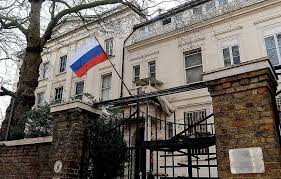
The Russian embassy in the UK has claimed that Ukraine’s “nationalist regime” is “preparing another provocation” that will “accuse Russia of allegedly massacring civilians in Irpen“.
All of this comes as Ukrainian leaders predict more gruesome discoveries in the days ahead, because retreating Russian forces have left devastation in their wake. The Mayor of Bucha – where Russian soldiers committed heinous war crimes – said investigators have found at least three sites of mass shootings of civilians. Most victims, he said, died from gunshots – not shelling – and corpses have been found with their hands tied, and “dumped like firewood” into recently uncovered mass graves, including one at a children’s camp.
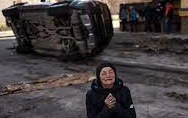
During one terrible incident in the town, Ukrainian men were tortured by soldiers, before the commander was asked what should now be done with them.
He answered: “Yebashit (fucking do them in)“, adding: “but do it away from the base”.
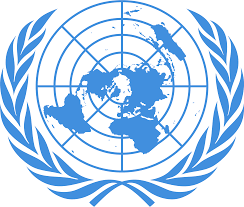
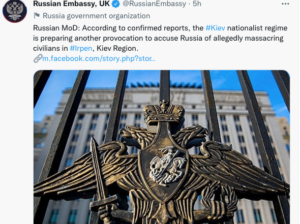
Writing on Twitter, the United Nations Secretary General Antonio Guterres, has called for an independent investigation that “leads to effective accountability”.
It appears that the Foreign Ministers of the G7 (a club of developed nations) have no doubt who is to blame. In a statement about the massacre, they said: “We, the G7 Foreign Ministers of Canada, France, Germany, Italy, Japan, the United Kingdom, and the United States of America, and the High Representative of the European Union, condemn in the strongest terms the atrocities committed by the Russian armed forces in Bucha and a number of other Ukrainian towns”.
The remark was made as Ukrainian president Volodymyr Zelenskiy, said the situation in the town of Borodianka was “much more disastrous” than in Bucha.
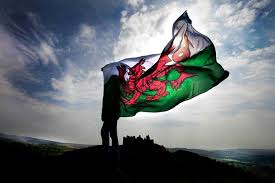
So what are we to make of China’s support (effectively) for this kind of behaviour?
For some, this shows, perhaps, what might happen when a smaller nation sits next to a bigger one (the population of Ukraine is 44 million, and the population of Russia is 144 million). But there is no danger whatsoever, thankfully, of Wales (population 3.1 million) being invaded by England (population 55 million), and the country benefits from being INSIDE a strong political union, which Ukraine is most definitely NOT in with Russia!
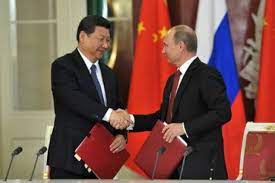
So there are major questions to be asked, both of Russia and China.
A film doing the rounds among officials in China may give a clue as to their thinking. It lionises Josef Stalin, and blames famines (in, for example, Ukraine) that followed his collectivisation of agriculture, on ‘rich’ peasants hoarding grain. It denies that his political purges killed millions, and calls it slander to accuse Adolf Hitler and Stalin of jointly launching the Second World War (Poland, which the two tyrants invaded from the west and the east, might disagree). It expresses outrage at those who say that some Soviet-era heroes and martyrs are inventions, and it accuses the West of having schemed to undermine the Soviet Union for decades, by handing Nobel prizes to dissenting writers, inviting reform-minded officials on academic exchanges and, by the late 1980s, supporting civil society and a free press.
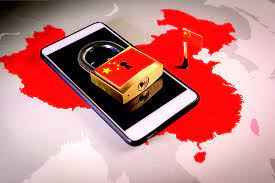
In both China and Russia media freedom has been severely restricted, so that it is difficult to get to the bottom of controversial events, and the kind of inquiring journalism we undertake on The Eye would NOT be tolerated.
Censorship in China (population 1.4 billion) has been implemented and mandated by the country’s ruling party, the Chinese Communist Party (CCP). Government officials censor content for mainly political reasons, such as in curtailing political opposition, as well as to block information about events which are unfavourable to the CCP, like, for instance, the 1989 Tiananmen Square protests and massacre, but also in order to maintain control over the populace.

Since Mr Jinping became General Secretary of the CCP (and is now seeking a THIRD term against norms) in 2012, censorship has been significantly tightened. The government now has control over all media capable of reaching a wide audience, including, television, print, radio, film, theatre, text messaging, instant messaging, video games, literature, and the internet.
Its grip is almost total, and there is only a semblance of defence for it. Chinese government officials assert that they have the right to control the internet’s content within their territory, and that their rules do not infringe on citizens’ right to free speech. Reporters Without Borders, though, ranks China’s freedom of the media situation as “very serious”, the worst ranking on their five-point scale.
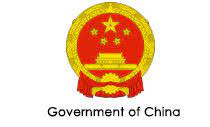
 Even 10 years ago China’s position was appalling. The ‘OpenNet Initiative’ classified internet censorship in China as “pervasive” in political and conflict/security areas, as well as “substantial” in those of social and internet tools, the two most extensive classifications of the five they use. Freedom House, a US-backed NGO, ranks the Chinese press as “not free”, the worst possible ranking, declaring that “state control over the news media in China is achieved through a complex combination of party monitoring of news content, legal restrictions on journalists, and financial incentives for self-censorship”.
Even 10 years ago China’s position was appalling. The ‘OpenNet Initiative’ classified internet censorship in China as “pervasive” in political and conflict/security areas, as well as “substantial” in those of social and internet tools, the two most extensive classifications of the five they use. Freedom House, a US-backed NGO, ranks the Chinese press as “not free”, the worst possible ranking, declaring that “state control over the news media in China is achieved through a complex combination of party monitoring of news content, legal restrictions on journalists, and financial incentives for self-censorship”.
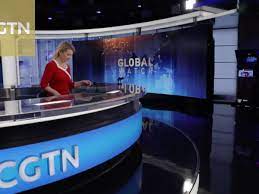
This awful state of affairs has had major personal ramifications, as for some time I was used as a political pundit on World Today (CGTN [China Global Television Network] Radio), but I informed them: ‘As you are state-run (they call it state-‘affiliated’), and, as I have written about on my website, I believe in media freedom, I no longer wish to contribute to ANY of your programmes https://the-eye.wales/nosey-m

Local journalists in mainland China and Hong Kong are also being targeted, while the authorities have labelled the FCC an “illegal organisation”. This term appears to be being bandied around willy-nilly, as Mr Jinping, exerts ever greater authority in China.
Journalists’ attempts to report facts, such as in the persecution of the mostly-Muslim Uyghur people in the north-western region of Xinjiang, are being severely hampered. Human rights groups believe China has detained more than one million Uyghurs against their will over the past few years, in a large network of what the state calls “re-education camps”, and that it has sentenced hundreds of thousands of them to prison terms. There is also evidence that Uyghurs are being used as slave labour, and of women being forcibly sterilised, as well as some former camp detainees alleging that they have been tortured and sexually abused.
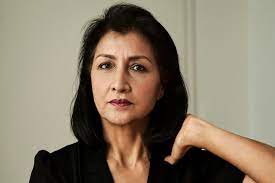
Two recent books have laid bare in horrifying detail what is happening inside China. ‘In The Camps’ by Darren Byler, describes how facial recognition and high-technologuy surveillance, make resistance impossible. The accounts from Gulbahar Haitiwaji in ‘How I Survived a Chinese ‘Reeducation’ Camp’ are just as disturbing. Internees are forced to stand motionless for hours, sit on plastic stools, day in day out, until their intestines prolapse, and are told to sing patriotic songs, giving thanks to Mr Jinping. “We were eternal victims, bowed under the weight of threats”, says Ms Haitiwaji.
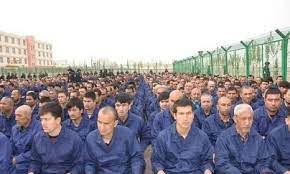
CGTN, however, have a slightly different view of events surrounding the Uyghurs, and their journalists have ‘reported’ that: “Some anti-China forces in the West, including the United States, have concocted and disseminated plenty of false information about China’s Xinjiang Uygur Autonomous Region”.
Yet last year Ofcom said the company which possesses the UK licence for CGTN is not actually in charge, which is against its rules. It seemed that Star China Media Limited (SCML), which owns the licence for CGTN, “did not have editorial responsibility”. This judgement was made after accusations that CGTN repeatedly breached impartiality rules and aired forced confessions. Ofcom had also received a complaint stating that CGTN should not be allowed to broadcast at all because it was effectively controlled by the CCP. The director of human rights group Safeguard Defenders, Peter Dahlin, said: “The best way forward is to revoke their (CGTN/SCML) licence to teach them that this is unacceptable”.
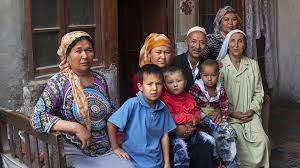
This has come after many years, during which worrying news has been revealed about what is happening inside China. 10 years ago the FCC was forced to issue a warning to its members after three employees of European media companies were attacked. The reporters for the companies were covering land rights protests in the village of Panhe, in the eastern Zhejiang province, and in one incident, a French reporter had his car rammed, while a group of men beat up his Chinese assistant. In another, a Dutch correspondent was attacked by men who seemed to be plain-clothes police.
 The events today in Ukraine are another type of warning – that banning a free media is totally wrong, otherwise terrible atrocities might never be uncovered, and the country which commits them (Russia) should be condemned, not supported (China).
The events today in Ukraine are another type of warning – that banning a free media is totally wrong, otherwise terrible atrocities might never be uncovered, and the country which commits them (Russia) should be condemned, not supported (China).
Tomorrow – why Phil always knew that stories were often driven by the wider issue of whether the population was growing or declining, and this could also lie behind the unprovoked invasion of Ukraine by Russia.
Publication of another book, however, was refused, because it was to have included names










